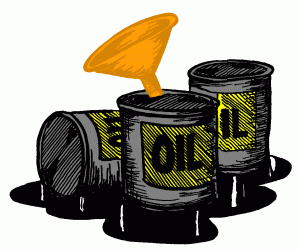According to the World Bank, the global oil price benchmark, Brent crude, will average $84 per barrel in 2023. This was noted by the Bank in its Commodity Markets Outlook report, which was issued earlier today, October 30.
According to the World Bank analysis, Brent crude oil prices are expected to average $84 per barrel in 2023, before falling further in 2024 as global economy slows.
They are expected to level down in 2025 when demand and supply rebound.
According to the World Bank study, the Energy Price Index increased by 9% in the third quarter of 2023, mostly due to an 11% increase in oil prices, which accounted for approximately 80% of the index.
This surge occurred following OPEC+ supply cutbacks.
In the financial context, the Brent crude oil price experienced fluctuations, reaching a peak of $120 per barrel in June 2022 but receding by 23% to $95 per barrel by mid-October 2023.
Various factors, such as shifts in expectations for economic growth and alterations in OPEC+ oil cuts, significantly influenced these price variations throughout the year.
Furthermore, oil prices were affected by the failure of major banks, fears of a global recession, and OPEC+ production cuts, which led to steady price increases over the last few months.
The Israel-Gaza Conflict Context
The World Bank report noted that amid the onset of conflict in the Middle East, energy prices surged by 9%.
However, if the conflict does not escalate, the index is projected to drop by 29% in 2023 compared to 2022 due to expected decreases in natural gas and coal prices.
Further declines of 5% in 2024 and 1% in 2025 are anticipated, but prices are expected to remain relatively high by historical standards.
The Brent price surged by 6% at the onset of the recent Middle Eastern conflict, driven by uncertainty surrounding supply implications, and is expected to experience continued volatility.
Note that the current Middle East conflict has significantly heightened geopolitical risks and is considered a crucial driver of global oil prices.
Should this conflict widen into a larger regional crisis, it could substantially affect oil markets, leading to a higher chance of decreased oil supply from the Middle East.
However, the World Bank report noted that if the Middle East conflict does not escalate, the projected average for Brent crude oil prices in 2023 is around $84 per barrel, a decrease from nearly $100 per barrel in 2022.
To achieve this annual average, the price is expected to reach nearly $90 per barrel in the final quarter of 2023.
Forecasts anticipate an increase in OPEC oil supply, provided Saudi Arabia’s voluntary cuts are paused by January 2024.
Meanwhile, the growth of non-OPEC+ production is likely to slow, transitioning from about 2 million barrels per day (mb/d) this year to 1.4 mb/d in 2024.
This change will involve production increments in countries like Brazil, Canada, Guyana, and the United States. In the upcoming years, a slight decrease in oil prices is predicted for 2024, followed by a further reduction in 2025.
However, these prices are anticipated to remain roughly 16% higher than the previous 5-year average of $70 per barrel.
The Nigerian context
According to World Bank predictions, a further increase in Brent crude price (almost $90 per barrel) by the fourth quarter of 2023 might benefit the Nigerian oil market.
However, this is only conceivable if the country is able to raise oil output as it has promised.
If oil production grows and the country meets its OPEC quota of 1.7 million barrels per day, revenues might increase by Q3/2023.
However, crude oil theft has consistently impacted oil production.
It is worth noting that the country produced 1.5 million barrels per day in September 2023, with condensate production accounting for a sizable portion of that total.






